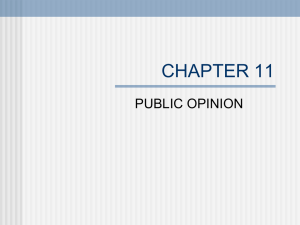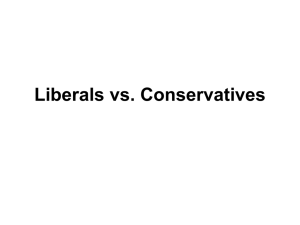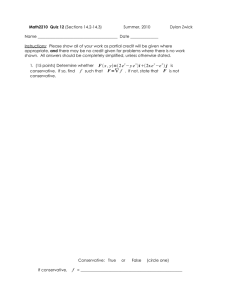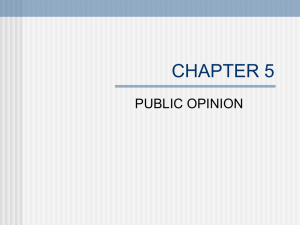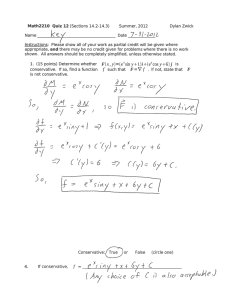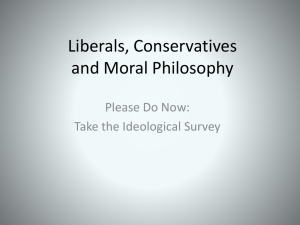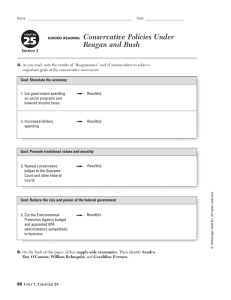Retrospective lecture notes for Sept 27, 2007
advertisement
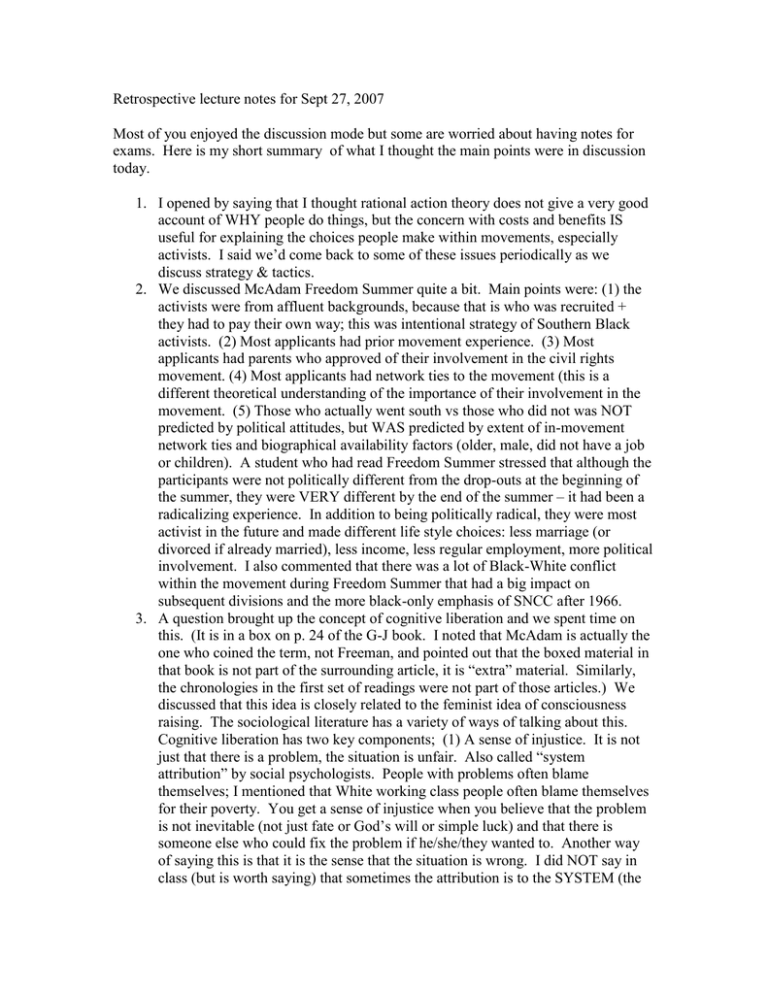
Retrospective lecture notes for Sept 27, 2007 Most of you enjoyed the discussion mode but some are worried about having notes for exams. Here is my short summary of what I thought the main points were in discussion today. 1. I opened by saying that I thought rational action theory does not give a very good account of WHY people do things, but the concern with costs and benefits IS useful for explaining the choices people make within movements, especially activists. I said we’d come back to some of these issues periodically as we discuss strategy & tactics. 2. We discussed McAdam Freedom Summer quite a bit. Main points were: (1) the activists were from affluent backgrounds, because that is who was recruited + they had to pay their own way; this was intentional strategy of Southern Black activists. (2) Most applicants had prior movement experience. (3) Most applicants had parents who approved of their involvement in the civil rights movement. (4) Most applicants had network ties to the movement (this is a different theoretical understanding of the importance of their involvement in the movement. (5) Those who actually went south vs those who did not was NOT predicted by political attitudes, but WAS predicted by extent of in-movement network ties and biographical availability factors (older, male, did not have a job or children). A student who had read Freedom Summer stressed that although the participants were not politically different from the drop-outs at the beginning of the summer, they were VERY different by the end of the summer – it had been a radicalizing experience. In addition to being politically radical, they were most activist in the future and made different life style choices: less marriage (or divorced if already married), less income, less regular employment, more political involvement. I also commented that there was a lot of Black-White conflict within the movement during Freedom Summer that had a big impact on subsequent divisions and the more black-only emphasis of SNCC after 1966. 3. A question brought up the concept of cognitive liberation and we spent time on this. (It is in a box on p. 24 of the G-J book. I noted that McAdam is actually the one who coined the term, not Freeman, and pointed out that the boxed material in that book is not part of the surrounding article, it is “extra” material. Similarly, the chronologies in the first set of readings were not part of those articles.) We discussed that this idea is closely related to the feminist idea of consciousness raising. The sociological literature has a variety of ways of talking about this. Cognitive liberation has two key components; (1) A sense of injustice. It is not just that there is a problem, the situation is unfair. Also called “system attribution” by social psychologists. People with problems often blame themselves; I mentioned that White working class people often blame themselves for their poverty. You get a sense of injustice when you believe that the problem is not inevitable (not just fate or God’s will or simple luck) and that there is someone else who could fix the problem if he/she/they wanted to. Another way of saying this is that it is the sense that the situation is wrong. I did NOT say in class (but is worth saying) that sometimes the attribution is to the SYSTEM (the 4. 5. 6. 7. government, the elites) and other times to OTHER GROUPS (blaming minorities, typically, or Godless Communists, or other groups that are the source of evil or unfair advantage). (2) Change is possible, and collective action can make a difference in producing the change. We talked more the last time about the importance of this. You feel like your actions personally will make a difference to the movement, and you feel that the movement will make a difference in the situation. We talked a bit about consciousness-raising in the women’s movement. “The personal is political” in the 1970s did not mean that only personal life mattered, but that your personal experiences were shaped by the larger forces of oppression in the society, that you could start from the personal and use it as a basis for coming to understand the social forces. I mentioned that this was adapted by leftists from their understanding of consciousness-raising in the Chinese revolution (the second, Maoist one). Discussion of Inglehart post-materialist values. His argument is that people who don’t worry about eating and have not been through war can afford to be more concerned about “higher” issues; he correlates this with the effect of education on political attitudes. I put this in the context of European movements: for Europeans before the 1960s, class had been THE axis of political division in Europe. The thing Inglehart is trying to explain is why that stopped being true. I commented that this seems confusing to people in the US, because we have a different political and social structure. I asserted that race is the central axis of division in the US, and commented that Europeans often view the US Black movement as an “identity” movement similar to the gay movement, while people in the US would never think this, would view the US Black movement as a movement about materialist oppression. We also talked a bit about issues of whether & how your material experiences shape your political attitudes. I mentioned that, beginning with Marx, there is a lot of sociology that talks about work experiences shaping consciousness & beliefs, but obviously your attitudes and beliefs can shape your choice of occupation. These are mutually reinforcing. From Inglehart I went into a short exposition of economic vs social axes in the US. Economic conservatives believe in free market, typically believe that inequality is fair because it is tied to hard work and productivity; economic liberals believe in social policies to promote equality, either redistributive taxes or social welfare programs to provide benefits to cushion problems of poverty, or both. Social conservatives on the “sex” dimension tend to be those who are tied to conservative religions; social liberals on the “sex” dimension tend to be nonreligious or tied to liberal religions. White social conservatives also tend (but not always) to be more pro-White and anti-minority (especially anti-Black), and White social liberals tend to be more open/tolerant of other races. Racial minorities also vary on the social liberal-conservative dimension, but for them it does not correlate with race attitudes. So, I said, it is religion that basically structures social liberal/conservative. Less educated people tend to be more conservative religious, so less educated people tend to be more social conservative, but if an educated person is religious conservative, they are likely to be social conservative. For economics, the educated split: business elites tend to be economic conservatives, while intellectual elites & social service professionals tend to be economic liberals. So, Republicans have linked social & economic conservatism. Democrats have linked social & economic liberalism. Educated intellectual elites tend to be both social & economic liberals. Educated business elite tend to be economic conservative & social liberal (unless they are also conservative religious). White working class tends to be economic liberal and social conservative. Blacks tend to be economic liberals and social conservatives because they are often conservative religious (except that they are not anti-Black, duh), but the race politics of the Republican Party has kept them Democrats. Latinos tend to vote Democratic but if religious are social conservatives as well. 8. I made a point of stressing that I thought the common theory underlying all the different patterns described in the readings is social networks and socialization processes. That people learn the beliefs and attitudes of the people around them and are influenced by their contexts. We talked a bit about Southern Indiana vs Madison. 9. Brief mention of the Cotgrove/Duff article on enrionmentalists which seems pretty similar to Inglehart and the Aho article on “Christian Patriots” which basically says that their religious beliefs inform their world view. I did not say in class, but he says that the believe there is an active force for evil in the world. This is probably worth following up in future classes. 10. I briefly said that I’m really interested in the role of religion in movements even though I don’t have many readings on this, and stressed what I think is a key case to ponder in thinking about this, that the same conservative Protestant theology animated both the Southern Black Civil Rights Movement and the Southern White segregationists.
